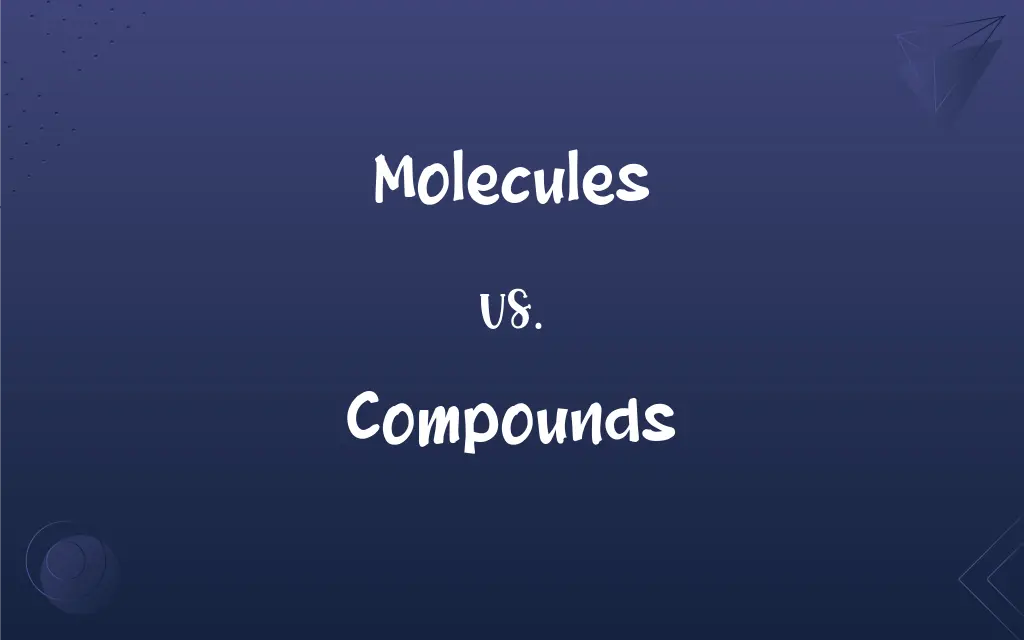Molecules vs. Compounds: What's the Difference?
Edited by Aimie Carlson || By Harlon Moss || Updated on October 11, 2023
Molecules are two or more atoms bonded together, while compounds are molecules that contain at least two different elements. Both are chemical entities but have different compositions and characteristics.

Key Differences
Molecules represent the smallest particles in a chemical species that can exist independently. Compounds, however, are substances formed when two or more elements are chemically bonded together. The distinction lies in the elemental composition: molecules might consist of single or multiple elements, while compounds always involve more than one.
Molecules showcase a range in complexity, from simple diatomic ones, like oxygen (O2), to intricately large ones, like DNA. Compounds, on the other hand, exhibit a necessity for chemical diversity, meaning they must be composed of at least two different elements, such as water (H2O), always combining in a fixed ratio.
Every compound is a molecule, but not every molecule is a compound. This holds true because while compounds hold the complexity and specificity of containing different elements, molecules can simply be units of the same element bound together, embracing simplicity.
Molecules can exist in various states of matter: solids, liquids, and gases, defined by their composition and structure. Compounds, with their varied elemental makeup, present unique properties distinct from their constituent elements, such as boiling and melting points, reactivity, and color.
Molecules stand as the fundamental units, being basic and not necessarily complex. Compounds, due to their diverse elemental make-up, display unique characteristics, resulting from the interactions and bonds between the different atoms, offering a vast array of chemical possibilities.
ADVERTISEMENT
Comparison Chart
Definition
Groups of atoms bonded together.
Molecules with at least two different elements.
Elemental Diversity
Can be the same or different elements.
Must have different elements.
Example
O2 (Oxygen)
H2O (Water)
Complexity
Can be simple or complex.
Usually have more complex structures.
Physical and Chemical Properties
Defined by type and number of atoms.
Defined by new characteristics different from the constituent elements.
ADVERTISEMENT
Molecules and Compounds Definitions
Molecules
Molecules can be simple, with only two atoms, or complex, comprising numerous atoms.
A glucose molecule (C6H12O6) is complex, with 24 atoms.
Compounds
All compounds are molecules but exhibit a specific chemical composition.
Carbon dioxide (CO2) is a compound because it contains two different elements.
Molecules
Molecules are recognized as the primary constituents in the structures of compounds.
Every molecule of sodium chloride (NaCl) consists of one sodium and one chlorine atom.
Compounds
A compound is a substance formed when two or more different elements chemically bond in a fixed ratio.
Water (H2O) is a compound consisting of hydrogen and oxygen.
Molecules
A molecule is the smallest particle in a chemical species capable of independent existence.
A molecule of water (H2O) consists of two hydrogen atoms and one oxygen atom.
Compounds
Compounds exhibit properties that are distinct from those of their constituent elements.
Sodium chloride (NaCl) has different properties than its constituent elements, sodium (Na) and chlorine (Cl).
Molecules
Molecules can also contain different atoms, forming heteronuclear molecules.
CO2 comprises one carbon atom and two oxygen atoms.
Compounds
The atoms within compounds are held together by chemical bonds, such as covalent or ionic bonds.
In sodium chloride (NaCl), the sodium and chlorine are held together by an ionic bond.
Molecules
Molecules can comprise atoms of the same element, forming homonuclear molecules.
O2 is a molecule consisting of two oxygen atoms.
Compounds
Compounds can only be separated into their constituent elements through chemical reactions.
Electrolysis can separate water into hydrogen and oxygen.
Molecules
The smallest particle of a substance that retains the chemical and physical properties of the substance and is composed of two or more atoms; a group of like or different atoms held together by chemical forces.
Compounds
To combine so as to form a whole; mix
Tin was often compounded with lead to make pewter.
Molecules
A small particle; a tiny bit.
Compounds
To produce or create by combining two or more ingredients or parts; compose or make up
Pharmacists compounding prescriptions.
Molecules
Plural of molecule
FAQs
What is a molecule?
A molecule is a group of two or more atoms bonded together.
Can compounds have the same physical properties as their elements?
No, compounds typically have different physical properties than their constituent elements.
Can a molecule be a single atom?
No, a molecule consists of at least two atoms.
Can molecules exist in all three states of matter?
Yes, molecules can exist in solid, liquid, and gaseous states.
Are all molecules visible to the naked eye?
No, molecules are typically too small to be seen without specialized equipment.
How can compounds be broken down?
Compounds can be broken down into their elemental parts through chemical reactions.
How are compounds named?
Compounds are named based on the elements they contain and the proportion of those elements.
Is the air we breathe a molecule or compound?
Air is a mixture of molecules, including compounds like carbon dioxide and elemental molecules like oxygen.
Do compounds always contain more than one element?
Yes, by definition, compounds contain at least two different elements.
Is ozone (O3) a molecule or a compound?
Ozone is a molecule because it contains only one type of element (oxygen), even though it contains three atoms.
Can molecules be created and destroyed?
Molecules can be created and destroyed through chemical reactions.
Are compounds homogeneous?
Yes, compounds are homogeneous and have uniform properties throughout.
Can molecules contain ions?
Yes, some molecules like hydronium (H3O+) contain ions.
Are all molecules compounds?
No, all compounds are molecules, but not all molecules are compounds.
What is a compound?
A compound is a substance formed from two or more different elements in a fixed ratio.
What is a molecular formula?
A molecular formula represents the number and type of atoms in a molecule.
Can a molecule contain another molecule?
Yes, some molecules, like vancomycin, contain a “molecule within a molecule” structure.
What is the smallest molecule?
Diatomic hydrogen (H2) is among the smallest molecules.
Can compounds be gases?
Yes, compounds can be solid, liquid, or gas, like water vapor (H2O).
How are compounds formed?
Compounds are formed through chemical reactions between elements.
About Author
Written by
Harlon MossHarlon is a seasoned quality moderator and accomplished content writer for Difference Wiki. An alumnus of the prestigious University of California, he earned his degree in Computer Science. Leveraging his academic background, Harlon brings a meticulous and informed perspective to his work, ensuring content accuracy and excellence.
Edited by
Aimie CarlsonAimie Carlson, holding a master's degree in English literature, is a fervent English language enthusiast. She lends her writing talents to Difference Wiki, a prominent website that specializes in comparisons, offering readers insightful analyses that both captivate and inform.































































